Deep reinforcement learning models the emergent dynamics of human cooperation
Mar 08, 2021Kevin R. McKee, Edward Hughes, Tina O. Zhu, Martin J. Chadwick, Raphael Koster, Antonio Garcia Castaneda, Charlie Beattie, Thore Graepel, Matt Botvinick, Joel Z. Leibo
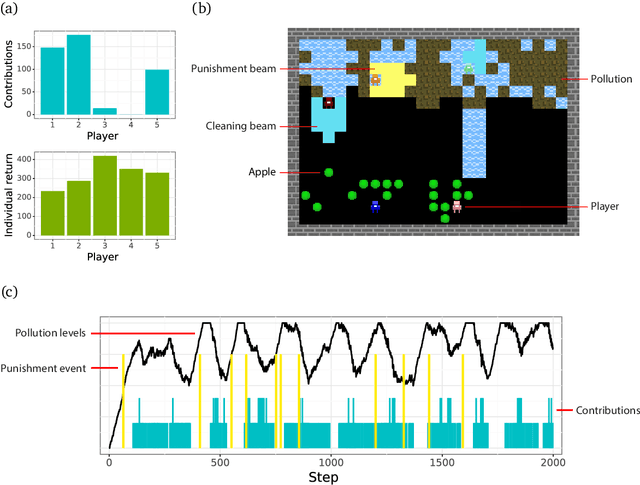
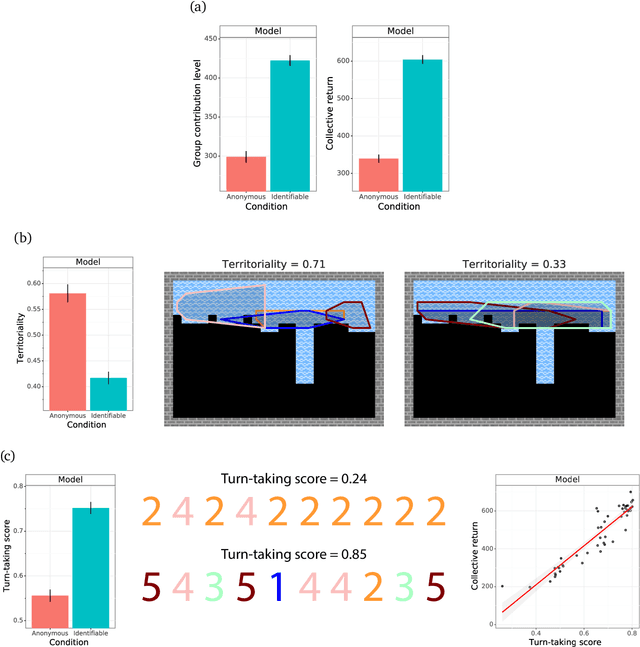
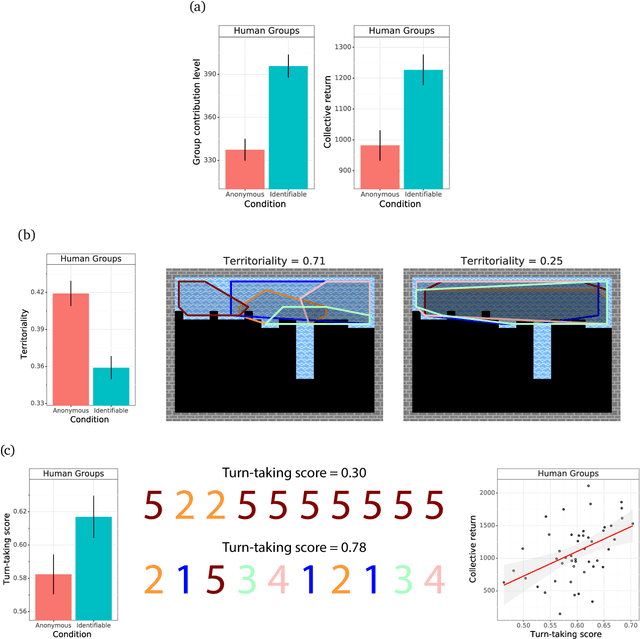
Collective action demands that individuals efficiently coordinate how much, where, and when to cooperate. Laboratory experiments have extensively explored the first part of this process, demonstrating that a variety of social-cognitive mechanisms influence how much individuals choose to invest in group efforts. However, experimental research has been unable to shed light on how social cognitive mechanisms contribute to the where and when of collective action. We leverage multi-agent deep reinforcement learning to model how a social-cognitive mechanism--specifically, the intrinsic motivation to achieve a good reputation--steers group behavior toward specific spatial and temporal strategies for collective action in a social dilemma. We also collect behavioral data from groups of human participants challenged with the same dilemma. The model accurately predicts spatial and temporal patterns of group behavior: in this public goods dilemma, the intrinsic motivation for reputation catalyzes the development of a non-territorial, turn-taking strategy to coordinate collective action.
Quantifying environment and population diversity in multi-agent reinforcement learning
Feb 16, 2021Kevin R. McKee, Joel Z. Leibo, Charlie Beattie, Richard Everett
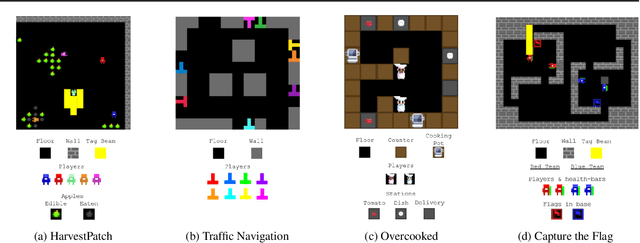
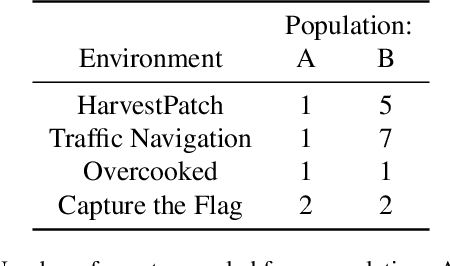
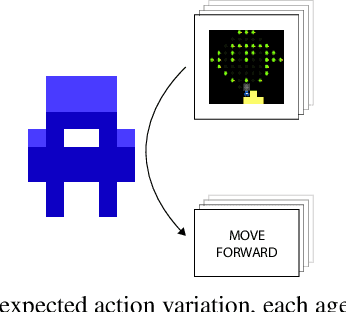
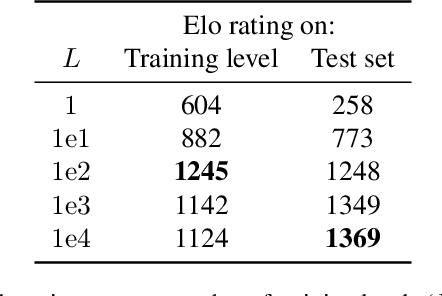
Generalization is a major challenge for multi-agent reinforcement learning. How well does an agent perform when placed in novel environments and in interactions with new co-players? In this paper, we investigate and quantify the relationship between generalization and diversity in the multi-agent domain. Across the range of multi-agent environments considered here, procedurally generating training levels significantly improves agent performance on held-out levels. However, agent performance on the specific levels used in training sometimes declines as a result. To better understand the effects of co-player variation, our experiments introduce a new environment-agnostic measure of behavioral diversity. Results demonstrate that population size and intrinsic motivation are both effective methods of generating greater population diversity. In turn, training with a diverse set of co-players strengthens agent performance in some (but not all) cases.
Fairness for Unobserved Characteristics: Insights from Technological Impacts on Queer Communities
Feb 09, 2021Nenad Tomasev, Kevin R. McKee, Jackie Kay, Shakir Mohamed
Advances in algorithmic fairness have largely omitted sexual orientation and gender identity. We explore queer concerns in privacy, censorship, language, online safety, health, and employment to study the positive and negative effects of artificial intelligence on queer communities. These issues underscore the need for new directions in fairness research that take into account a multiplicity of considerations, from privacy preservation, context sensitivity and process fairness, to an awareness of sociotechnical impact and the increasingly important role of inclusive and participatory research processes. Most current approaches for algorithmic fairness assume that the target characteristics for fairness--frequently, race and legal gender--can be observed or recorded. Sexual orientation and gender identity are prototypical instances of unobserved characteristics, which are frequently missing, unknown or fundamentally unmeasurable. This paper highlights the importance of developing new approaches for algorithmic fairness that break away from the prevailing assumption of observed characteristics.
Neural Recursive Belief States in Multi-Agent Reinforcement Learning
Feb 03, 2021Pol Moreno, Edward Hughes, Kevin R. McKee, Bernardo Avila Pires, Théophane Weber
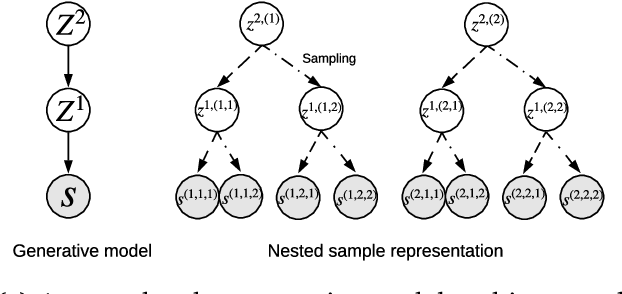

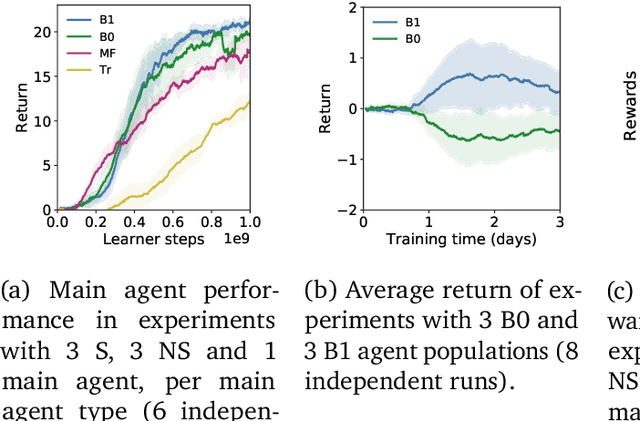
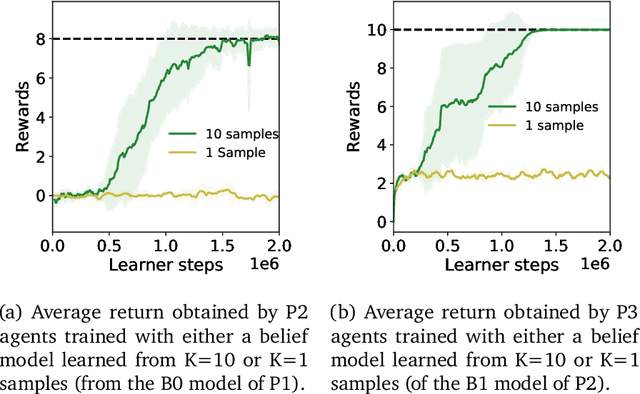
In multi-agent reinforcement learning, the problem of learning to act is particularly difficult because the policies of co-players may be heavily conditioned on information only observed by them. On the other hand, humans readily form beliefs about the knowledge possessed by their peers and leverage beliefs to inform decision-making. Such abilities underlie individual success in a wide range of Markov games, from bluffing in Poker to conditional cooperation in the Prisoner's Dilemma, to convention-building in Bridge. Classical methods are usually not applicable to complex domains due to the intractable nature of hierarchical beliefs (i.e. beliefs of other agents' beliefs). We propose a scalable method to approximate these belief structures using recursive deep generative models, and to use the belief models to obtain representations useful to acting in complex tasks. Our agents trained with belief models outperform model-free baselines with equivalent representational capacity using common training paradigms. We also show that higher-order belief models outperform agents with lower-order models.
Open Problems in Cooperative AI
Dec 15, 2020Allan Dafoe, Edward Hughes, Yoram Bachrach, Tantum Collins, Kevin R. McKee, Joel Z. Leibo, Kate Larson, Thore Graepel
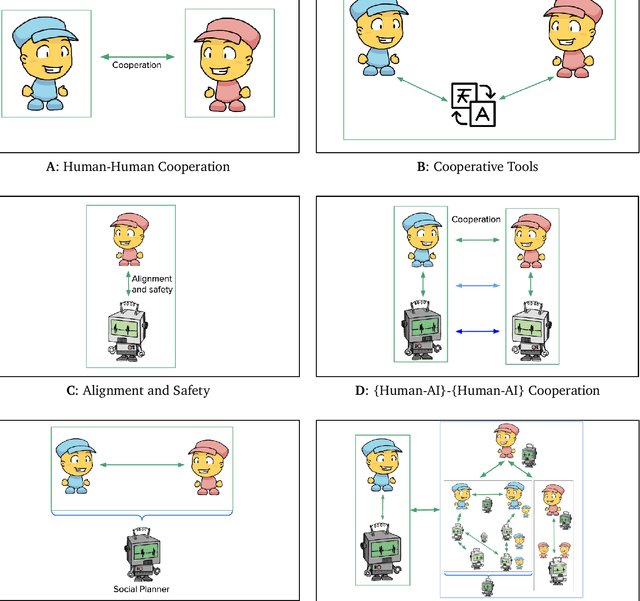
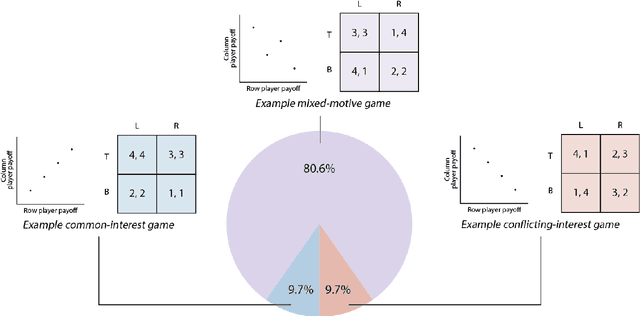


Problems of cooperation--in which agents seek ways to jointly improve their welfare--are ubiquitous and important. They can be found at scales ranging from our daily routines--such as driving on highways, scheduling meetings, and working collaboratively--to our global challenges--such as peace, commerce, and pandemic preparedness. Arguably, the success of the human species is rooted in our ability to cooperate. Since machines powered by artificial intelligence are playing an ever greater role in our lives, it will be important to equip them with the capabilities necessary to cooperate and to foster cooperation. We see an opportunity for the field of artificial intelligence to explicitly focus effort on this class of problems, which we term Cooperative AI. The objective of this research would be to study the many aspects of the problems of cooperation and to innovate in AI to contribute to solving these problems. Central goals include building machine agents with the capabilities needed for cooperation, building tools to foster cooperation in populations of (machine and/or human) agents, and otherwise conducting AI research for insight relevant to problems of cooperation. This research integrates ongoing work on multi-agent systems, game theory and social choice, human-machine interaction and alignment, natural-language processing, and the construction of social tools and platforms. However, Cooperative AI is not the union of these existing areas, but rather an independent bet about the productivity of specific kinds of conversations that involve these and other areas. We see opportunity to more explicitly focus on the problem of cooperation, to construct unified theory and vocabulary, and to build bridges with adjacent communities working on cooperation, including in the natural, social, and behavioural sciences.
Social diversity and social preferences in mixed-motive reinforcement learning
Feb 12, 2020Kevin R. McKee, Ian Gemp, Brian McWilliams, Edgar A. Duéñez-Guzmán, Edward Hughes, Joel Z. Leibo
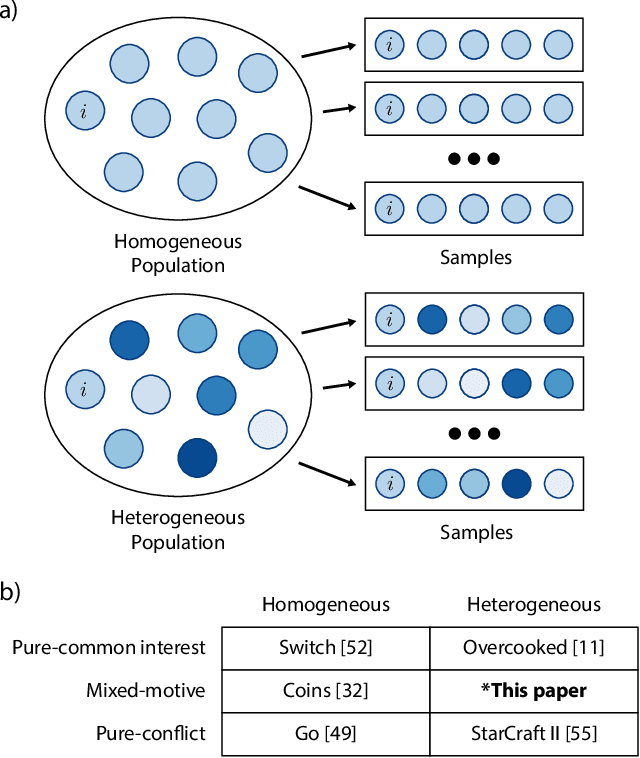
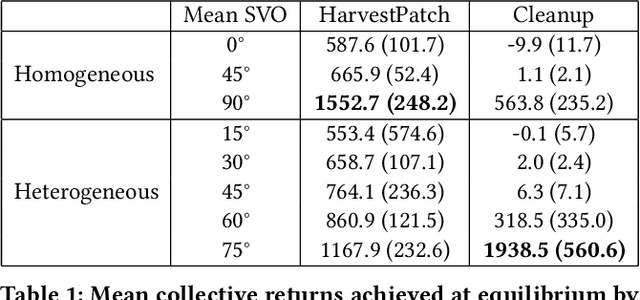
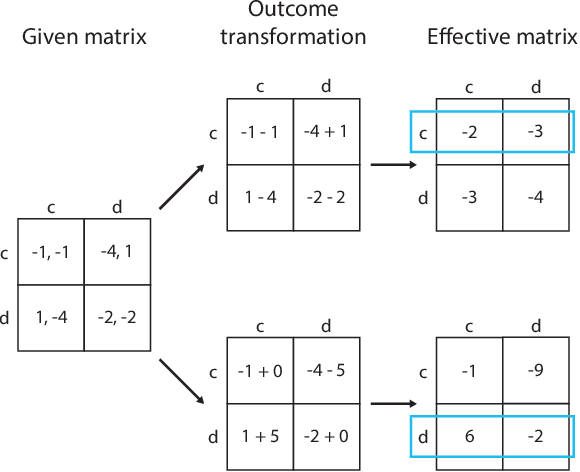
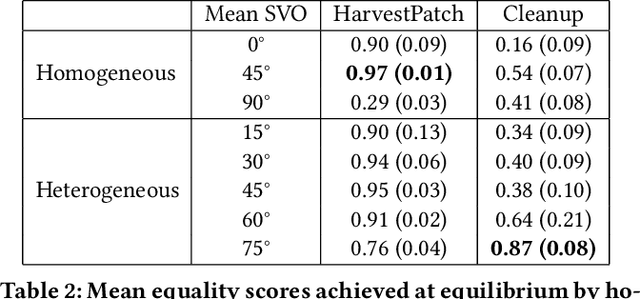
Recent research on reinforcement learning in pure-conflict and pure-common interest games has emphasized the importance of population heterogeneity. In contrast, studies of reinforcement learning in mixed-motive games have primarily leveraged homogeneous approaches. Given the defining characteristic of mixed-motive games--the imperfect correlation of incentives between group members--we study the effect of population heterogeneity on mixed-motive reinforcement learning. We draw on interdependence theory from social psychology and imbue reinforcement learning agents with Social Value Orientation (SVO), a flexible formalization of preferences over group outcome distributions. We subsequently explore the effects of diversity in SVO on populations of reinforcement learning agents in two mixed-motive Markov games. We demonstrate that heterogeneity in SVO generates meaningful and complex behavioral variation among agents similar to that suggested by interdependence theory. Empirical results in these mixed-motive dilemmas suggest agents trained in heterogeneous populations develop particularly generalized, high-performing policies relative to those trained in homogeneous populations.
Social Diversity and Social Preferences in Mixed-Motive Reinforcement Learning
Feb 06, 2020Kevin R. McKee, Ian Gemp, Brian McWilliams, Edgar A. Duéñez-Guzmán, Edward Hughes, Joel Z. Leibo




Recent research on reinforcement learning in pure-conflict and pure-common interest games has emphasized the importance of population heterogeneity. In contrast, studies of reinforcement learning in mixed-motive games have primarily leveraged homogeneous approaches. Given the defining characteristic of mixed-motive games--the imperfect correlation of incentives between group members--we study the effect of population heterogeneity on mixed-motive reinforcement learning. We draw on interdependence theory from social psychology and imbue reinforcement learning agents with Social Value Orientation (SVO), a flexible formalization of preferences over group outcome distributions. We subsequently explore the effects of diversity in SVO on populations of reinforcement learning agents in two mixed-motive Markov games. We demonstrate that heterogeneity in SVO generates meaningful and complex behavioral variation among agents similar to that suggested by interdependence theory. Empirical results in these mixed-motive dilemmas suggest agents trained in heterogeneous populations develop particularly generalized, high-performing policies relative to those trained in homogeneous populations.
Inequity aversion improves cooperation in intertemporal social dilemmas
Sep 27, 2018Edward Hughes, Joel Z. Leibo, Matthew G. Phillips, Karl Tuyls, Edgar A. Duéñez-Guzmán, Antonio García Castañeda, Iain Dunning, Tina Zhu, Kevin R. McKee, Raphael Koster, Heather Roff, Thore Graepel
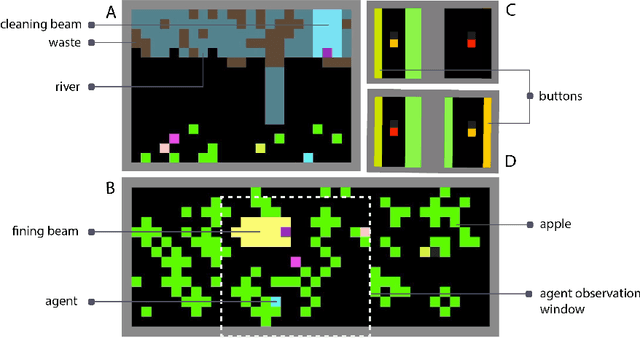
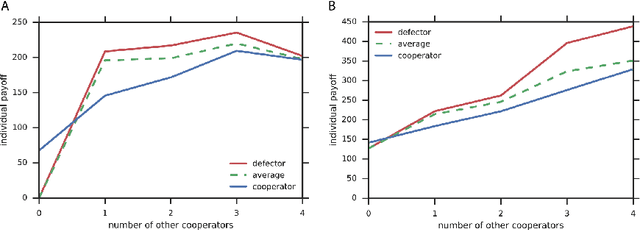
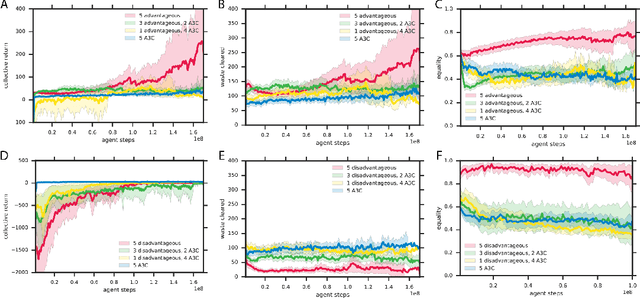
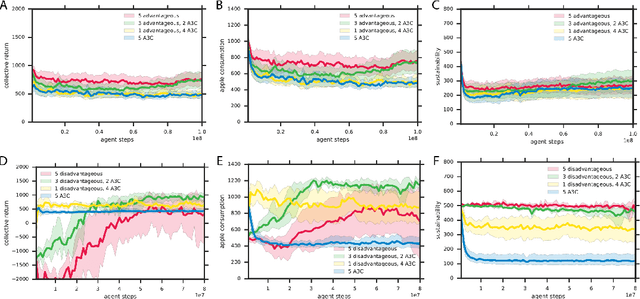
Groups of humans are often able to find ways to cooperate with one another in complex, temporally extended social dilemmas. Models based on behavioral economics are only able to explain this phenomenon for unrealistic stateless matrix games. Recently, multi-agent reinforcement learning has been applied to generalize social dilemma problems to temporally and spatially extended Markov games. However, this has not yet generated an agent that learns to cooperate in social dilemmas as humans do. A key insight is that many, but not all, human individuals have inequity averse social preferences. This promotes a particular resolution of the matrix game social dilemma wherein inequity-averse individuals are personally pro-social and punish defectors. Here we extend this idea to Markov games and show that it promotes cooperation in several types of sequential social dilemma, via a profitable interaction with policy learnability. In particular, we find that inequity aversion improves temporal credit assignment for the important class of intertemporal social dilemmas. These results help explain how large-scale cooperation may emerge and persist.
Relational inductive bias for physical construction in humans and machines
Jun 04, 2018Jessica B. Hamrick, Kelsey R. Allen, Victor Bapst, Tina Zhu, Kevin R. McKee, Joshua B. Tenenbaum, Peter W. Battaglia
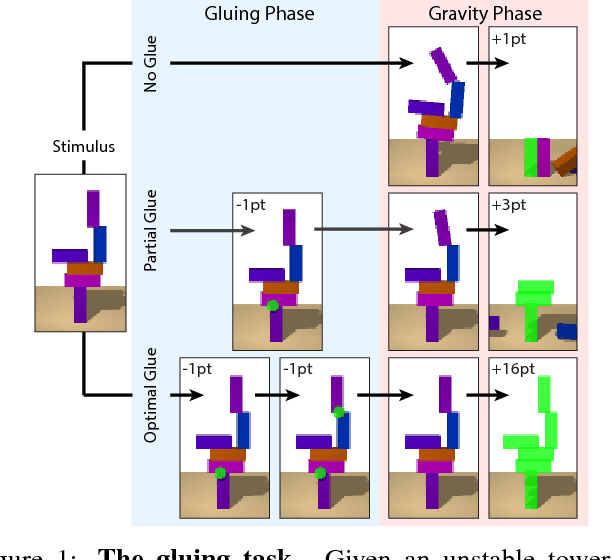
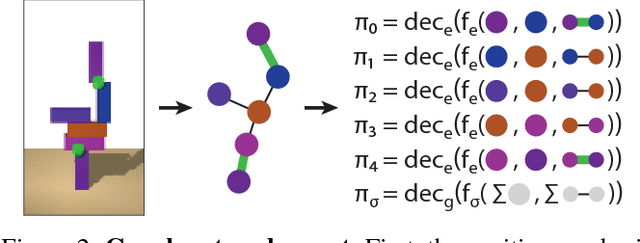
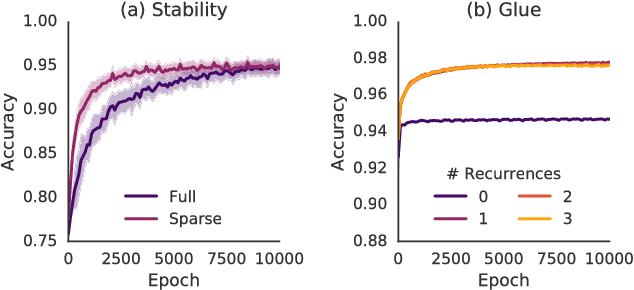
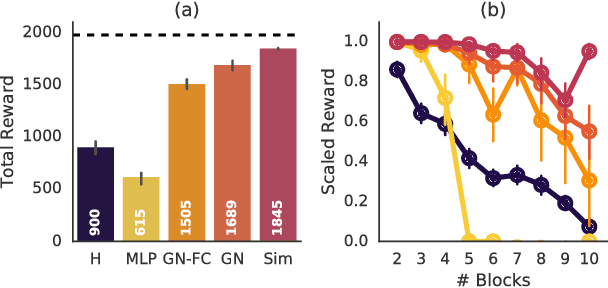
While current deep learning systems excel at tasks such as object classification, language processing, and gameplay, few can construct or modify a complex system such as a tower of blocks. We hypothesize that what these systems lack is a "relational inductive bias": a capacity for reasoning about inter-object relations and making choices over a structured description of a scene. To test this hypothesis, we focus on a task that involves gluing pairs of blocks together to stabilize a tower, and quantify how well humans perform. We then introduce a deep reinforcement learning agent which uses object- and relation-centric scene and policy representations and apply it to the task. Our results show that these structured representations allow the agent to outperform both humans and more naive approaches, suggesting that relational inductive bias is an important component in solving structured reasoning problems and for building more intelligent, flexible machines.
 Add to Chrome
Add to Chrome Add to Firefox
Add to Firefox Add to Edge
Add to Edge